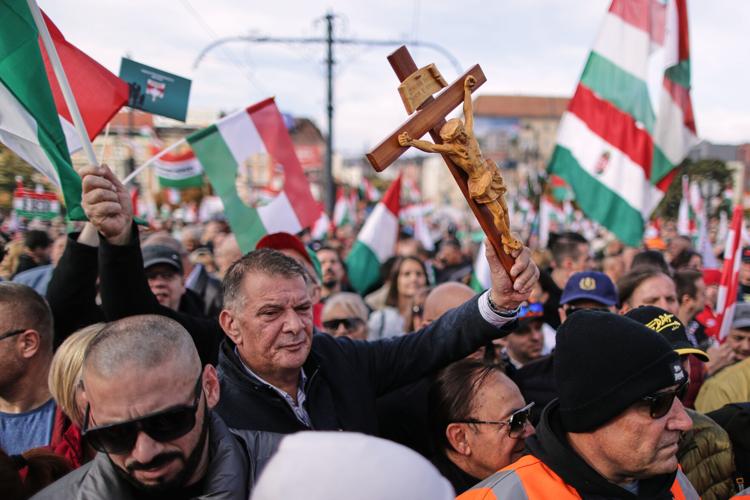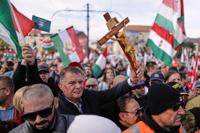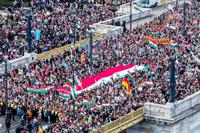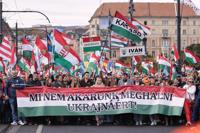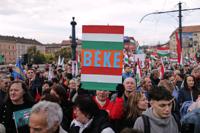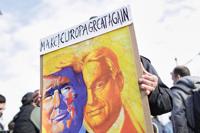BUDAPEST, Hungary (AP) — Thousands of Hungarians congregated on the streets of Budapest on Thursday in a show of force on behalf of their leader, Prime Minister Viktor Orbán, who six months ahead of parliamentary elections looks set to face the most competitive ballot in his 15 years in power.
The gathering, dubbed a “peace march” by organizers, came on Hungary’s Oct. 23 national holiday, a remembrance of a failed anti-Soviet uprising in 1956 that was crushed by the Red Army. Marchers shouted slogans backing Orbán and his message that Hungary is at risk of becoming directly involved in Russia's war in Ukraine.
At the front of the march, one large banner read: “We don’t want to die for Ukraine.” Attendees, waving flags bearing the names of the towns and villages across Hungary from which they came, set off along the Margaret Bridge spanning the Danube, backdropped by Hungary’s towering neo-Gothic parliament.
One marcher, Babett Lugosi, said she believed “national consciousness and Christianity” were in danger, and that Orbán was the only politician in Hungary capable of defending the country's interests against external threats.
“It’s very important that Europe and Hungary preserve their stability, and I am convinced that we are threatened from many directions, and we have to show that were are a sovereign country,” she said.
Orbán, considered Russian President Vladimir Putin's closest partner in the European Union, has consistently argued against Western support for neighboring Ukraine since Moscow's full-scale invasion in February 2022.
In contrast to nearly every other EU leader, he has maintained warm relations with the Kremlin while taking a combative posture toward Kyiv. He has argued for an immediate ceasefire in the conflict, though he has not addressed what that might imply for Ukraine's territorial integrity or European security amid continuing Russian aggression.
Orbán on Thursday was set to deliver a speech to his supporters following the march. Later in the day, supporters of Orbán’s main political challenger, Péter Magyar, were expected to gather in central Budapest for their own demonstration — both an anti-government protest and a show of force behind Magyar and his center-right Tisza party.
The dueling marches were seen as a barometer of which politician had more energy behind his campaign as elections near. Orbán, in power since 2010, is lagging in the polls behind Magyar’s Tisza, and with six months before the ballot, the Hungarian leader has sought to reinvigorate his base.
But the political mood in Hungary in recent months has made that task difficult: Persistent inflation, a stagnating economy and increasingly salient allegations of government corruption have plagued Orbán’s government, while the popularity of Magyar’s party has consistently grown.
Magyar, a 44-year-old lawyer and former insider within Orbán’s Fidesz party, has focused his campaign on the rural countryside, traditionally a reliable voting bloc for Fidesz. He recently ended an 80-day tour of the country where he held scores of town hall-style forums, giving speeches and taking questions from attendees.
On Thursday, scores of buses that were used to transport participants from around Hungary and neighboring countries were parked near the pro-government march route. One marcher, Sándor Kerekes, said he had come to the event from the ethnic Hungarian-majority town of Fantanele, in Romania’s Transylvania region.
“It’s important for us to feel like we can meet with like-minded people, that we think the same things and think with unity,” he said, adding that he expected the most important message from Orbán’s speech to be “togetherness, peace and harmony for all nations.”


